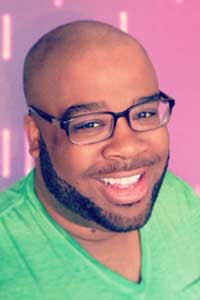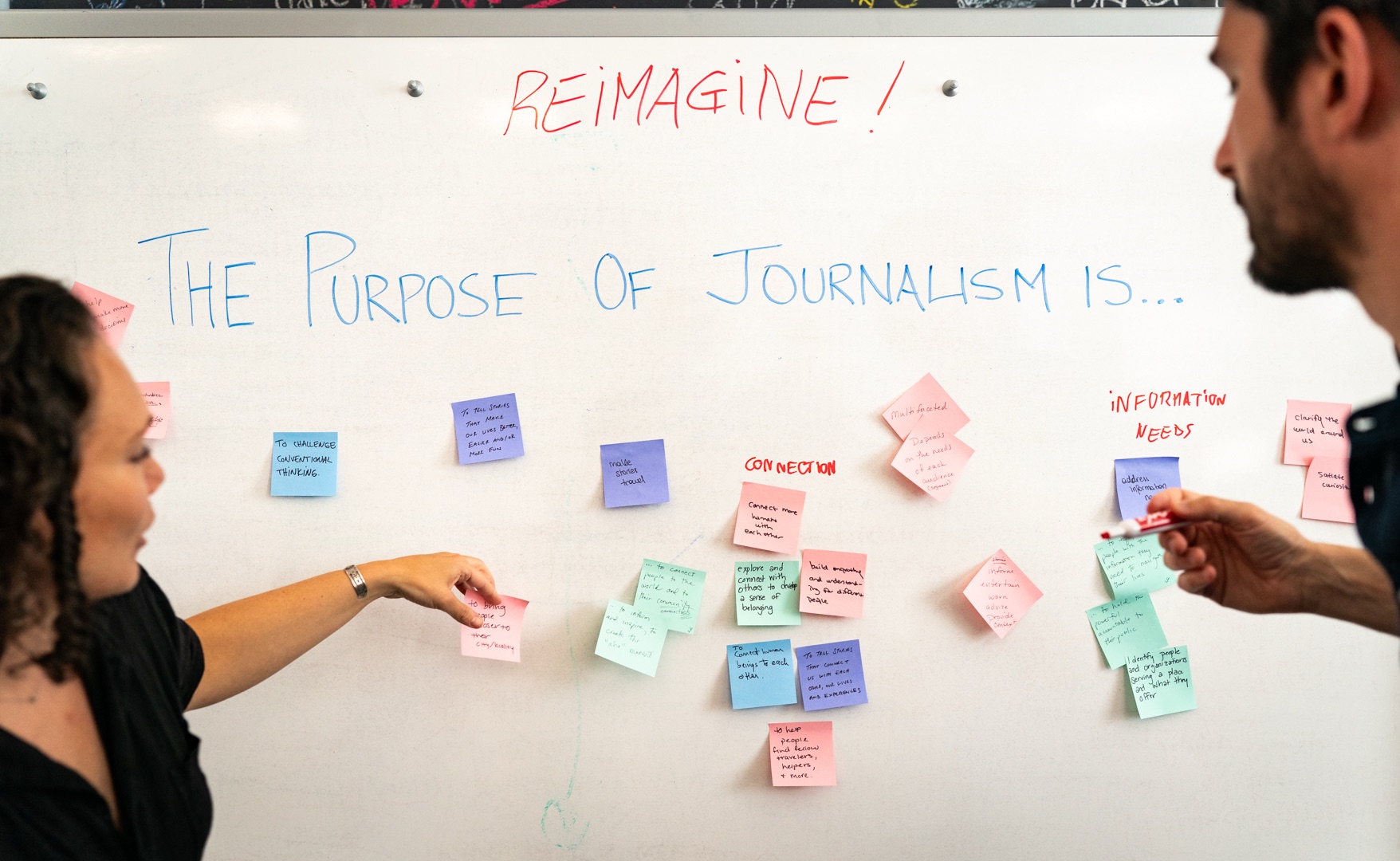The Lab’s profiles are Q&As with smart people who are shaping the future of media. Follow the series.
The first eight years of Mark S. Luckie's career have been rich with accomplishment. For starters he founded and sold 10,000 Words. Then he penned The Digital Journalist's Handbook, which was published in 2010 and is now in its third edition. He's also held a variety of writing and technology jobs at the Los Angeles Times, Entertainment Weekly/EW.com, The Washington Post, and other publications, picking up a slew of awards and recognitions along the way. Last year, Luckie became manager of journalism and news at Twitter, where he helps newsrooms get smart on how to use the service.

Do you have a story that explains how you got to where you are professionally?
When I was a kid I would take my trophies — from spelling bees, decathlons, etc. — and dismantle them with a wrench. I'd then use the parts to build bigger, more elaborate trophies, not because I was an overachiever but because I had a vision that what I had in front of me could be something more than it was.
My family came from modest means so I loved the scrappiness of building things from scratch or exploring how unfamiliar things work. I spent a lot of my time as a kid in the library reading film and photography books or individual volumes of the encyclopedia (nerdy, I know). That insatiable thirst for knowledge hasn't changed a bit, even as I grow older.
What do you do day-to-day to help newsrooms?
Most newsrooms are actively using Twitter because they understand its importance. What I try to do is provide resources for people to understand how to take even more advantage of it, understand the creative ways they can use the platform, and use it for reporting or to extend conversations.
One of the main reasons I love what I do is because there's always another level that you can take it to. Even if you are the person who is continually using Twitter to cover stories, there's Twitter data that can be explored or there's third-party Twitter tools that you may not be using just yet. A big chunk of what I do is work to understand what journalists' goals are and bring them closer to those goals.
Who inspires you most?
The people who inspire me the most are usually outside of journalism. My biggest inspirations are modern artists like Andy Warhol, Ran Hwang, Keith Haring and Jean Shin who take something mundane and transform it into something completely different. I always look for opportunities to visit a museum when I'm in a new city because it's non-stop inspiration for me.My biggest inspirations are modern artists ... who take something mundane and transform it into something completely different.
I'm hugely inspired by the work of Nam June Paik, a mixed media artist who immigrated from Korea to the U.S. — his work with multiple channel televisions, re-purposing video and making visually arresting installations makes me think differently about how I approach digital journalism and social media.
I'm in j-school now. Can you tell me about your experience in graduate school? Worth it?
Going to grad school is probably one of the best decisions I ever made. I got a foundational education in undergrad, but UC Berkeley's Graduate School of Journalism is what laid the foundation for my career in online/digital journalism.
The school introduced me to the digital media pioneers like Mindy McAdams, Andrew De Vigal, and Koci Hernandez who influenced the industry and inspired me to do more than everyone else was doing at the time. And because digital journalism was so new, I could use my time at the school as a testing ground for my ideas around technology and journalism. Plus, I was surrounded by professors and staff who were truly invested in my success and that is priceless.
You are well-versed in many social media platforms. How might journalists do a better job of integrating other social media tools into the newsroom?
The key is to not immediately dismiss something as novel or not integral to your work unless you actually try it out, give it some time, and see what happens.
There's a whole ecosystem of social media tools out there and you have to try everything to understand what works for your newsroom and your reporting. There are of course social networks like Twitter that millions of people use, but perhaps there is an additional tool that fills a specific need that you and a handful of other people have. The key is to not immediately dismiss something as novel or not integral to your work unless you actually try it out, give it some time, and see what happens.
Social media is where people from around the world are having conversations about everything from global news events to issues that impact them personally. If you're not using social media, either as an active participant or as a careful observer, you're missing a large part of the reporting process. You don't necessarily have to be the person who tweets or posts all the time, but certainly you should be aware of what people are talking about on social media and incorporate that into your reporting.
What should every news organization know about Twitter?
Three data points that every news organization should know:
- Hashtags are a great way to increase the reach of a tweet. Journalists who use hashtags in their tweets on average see 100 percent more engagement (retweets, replies, clicks on links). This is because of the way a tweet works: a hashtag exposes the tweet to a broader audience than just the people who follow an account. People who use hashtags are implicitly saying "I am joining a conversation on Twitter."
- Journalists who live tweet a news event on average see a 50 percent spike in their followers — it's hands down one of the best ways to grow your followers. The key is to pick an event that many people are interested in or that you have specific knowledge about where you can offer the behind-the-scenes experience that Twitter was made for. Live tweeting not only puts you in the center of the news story but also makes Twitter users more aware of the other stories you cover in your beat.
- Use the retweet button: On average, journalists who have above average follower growth send 200 percent more retweets than those who have below average follower growth. By retweeting other people, you are engaging with your followers and exposing them to other Twitter users they may be interested in. It's a win-win-win: it's a win for the journalist who gets increased follower growth, it's a win for the person they retweet who gets the shout-out and it's a win for the Twitter user who gets exposed to a new source of information.
Who is your favorite addition to Twitter this year?
My favorite new Twitterer has to be the Pope. In terms of big wigs on Twitter it doesn't get much bigger than the Pope. To see him actively using Twitter to share prayers and communicate with his followers really speaks to the diversity of the platform and what it can be used for. Yes, there's news and entertainment, but there's also a spiritual element to it as well and that's amazing to witness.
What do you read religiously?
I was an avid user of Google Reader for many years before its discontinuation (I've since moved on to Feedly as a reader) because it allowed me to sift through hundreds of blogs and zero in on great content from all over the web.
I read a lot — everything from tech blogs like ReadWriteWeb and Mashable to photography blogs like The Sartorialist and Scouting NY. One of my favorite blogs to read though is Mental Floss, which has a little bit of everything in terms of pop culture and historical information. It may not be the most relevant to my work but it really gets my mind turning about what's happening in the world.
What is the question that no one asks you, but you wish that someone would?
The number one question people rarely ask me is "Why?" It's interesting being outside of the newsroom and on the other side of the coin because I now have a greater understanding of how important it is to ask follow-up questions. It's important to ask why something is happening rather than just the what. And that's everything from the personal to the professional.The number one question people rarely ask me is Why? It's important to ask why something is happening rather than just the what.
What applications do you have open while you're working?
If I'm at my desk, I usually have TweetDeck open because I can follow what's going around the world and in the Twittersphere. The new filters are great for surfacing interesting conversations and tweets that I might not have otherwise picked up.
I also am an avid user of music discovery apps like Pandora and Grooveshark to get a soundtrack going for my workday. My new favorite app is Dark Sky which warns you when it's about to rain and graphs coming rainfall — NYC has been soaked lately and it's nice to know when I need to whip out the umbrella.
What could the world use a little more of? What could the world use a little less of?
The world could use a lot more innovation and a lot less groupthink, to borrow a phrase. I know that in itself is a cliché but lots of people talk about the same ideas and look to the same people for inspiration and there are so many other communities from which to draw inspiration from.That's the key to thriving in any industry — you have to find the technologies that no one else is talking about that you can experiment with and make it your own.
One of my favorite resources to follow is a site called SpringWise, which highlights burgeoning technology or creative uses of existing tech before it hits the echo chamber — things that I haven't already heard a millions elsewhere.
I believe everyone should find a Kickstarter and help get some technology off the ground that doesn't exist yet. That's the key to thriving in any industry — you have to find the technologies that no one else is talking about that you can experiment with and make it your own.
About the author





